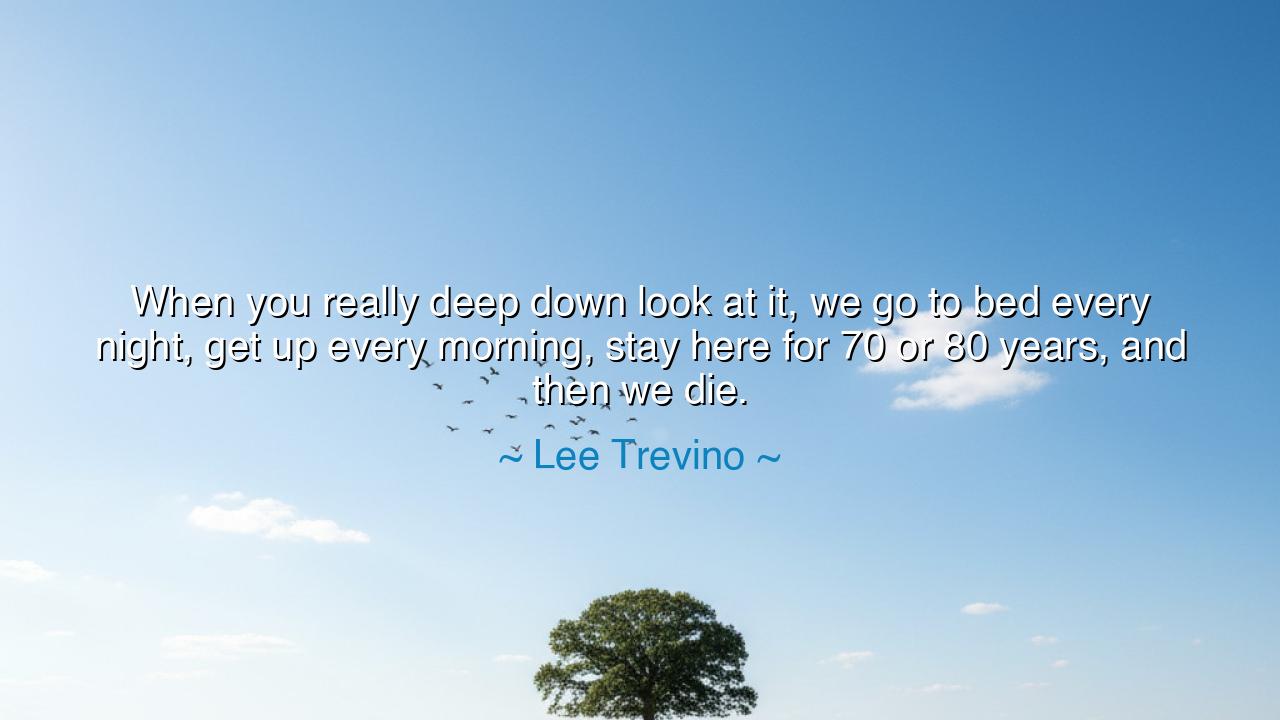
When you really deep down look at it, we go to bed every night
When you really deep down look at it, we go to bed every night, get up every morning, stay here for 70 or 80 years, and then we die.






In the quiet moments of reflection, when the mind casts its gaze upon the vast expanse of life, there comes a sobering realization—life, as we know it, is fleeting, fragile, and ultimately, brief. Lee Trevino, a man whose career on the golf course brought joy to millions, once spoke of this truth when he said, "When you really deep down look at it, we go to bed every night, get up every morning, stay here for 70 or 80 years, and then we die." In these words, Trevino distills the essence of the human experience, reducing it to its simplest form. The days are long, the years are many, but in the end, the truth is undeniable—we live, we age, and we eventually pass.
This reflection on the brevity of life is not new. In the ancient world, philosophers, poets, and sages spoke often of the fleeting nature of existence. Socrates himself, in his final moments before drinking the hemlock, acknowledged the transient nature of human life. “The unexamined life is not worth living,” he declared, urging his followers to seek meaning even in the face of mortality. Trevino’s quote echoes this same sentiment—that while we live, we must understand the briefness of our existence and use it to guide our actions, our thoughts, and our hearts.
The ancient Romans, too, understood this well. The poet Horace, in his famous lines, wrote, “Carpe diem,” urging the people to “seize the day.” To him, the fleeting nature of time demanded action, demanded purpose. Just as Trevino speaks of the inevitability of sleep and death, so did Horace remind his readers to live fully, to embrace the moments that pass swiftly by. For the Romans, life was an opportunity to achieve greatness, not in the quantity of years lived, but in the quality of the life led during those years.
But Trevino’s reflection is not one of despair. It is, in truth, a call to awareness—a reminder that the days we have are finite, that the time we have is not limitless. In the same way that a skilled athlete knows the fleeting nature of their career, so too must we recognize the preciousness of our own lives. Alexander the Great, having conquered much of the known world by the time he was in his thirties, was said to have wept when he realized there were no more worlds to conquer. His lament, though born of personal ambition, reveals a deeper truth: no matter how great or powerful we become, time marches on, and life’s ultimate outcome remains the same for us all. Trevino’s words are a humbling reminder of this.
This truth—the brevity of life—is a powerful teacher. It asks us not to waste our days in idle pursuits or in the pursuit of things that do not matter in the grand scheme. The ancient warrior-king Cyrus the Great understood this well. Though he was the founder of the Persian Empire and one of history’s most successful conquerors, Cyrus was known for his deep reflection on life and mortality. He often told his generals that to rule wisely was not merely to conquer territories but to understand the value of time, and the need to live honorably in the time one is given. Like Trevino, Cyrus understood that the number of days was not as important as how those days were spent.
The lesson from Trevino’s words, then, is clear: life is short, and it is up to us to make it meaningful. We must recognize the reality of our limited time and use it to its fullest. Whether it is in the quiet moments of reflection or in the pursuit of our greatest ambitions, we must live intentionally. Let us not waste the time we are given on trivialities or distractions. Like the warriors of old, let us face each day with purpose, understanding that each moment is an opportunity to act, to achieve, and to leave a lasting impact.
So, as we walk the path of life, let us take this lesson to heart. Every day is a gift, and every moment spent is one that we will never have again. Let us live with intention, let us strive to be the best versions of ourselves, and let us understand that in the end, it is not the number of our days but how we live them that truly matters. In doing so, we will honor the fleeting nature of life, and in turn, we will make every moment count.






AAdministratorAdministrator
Welcome, honored guests. Please leave a comment, we will respond soon